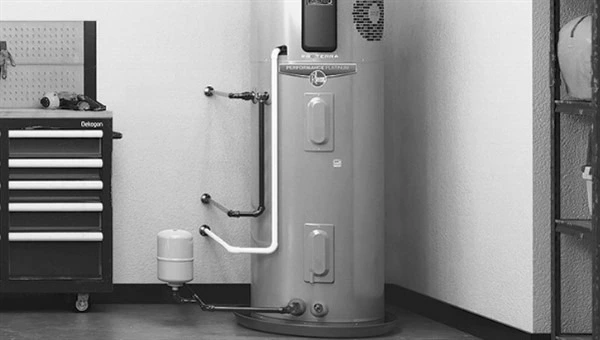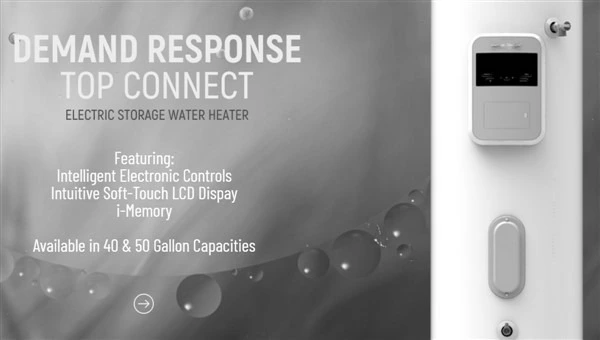Are you considering upgrading your water heater to a more energy-efficient option? Heat pump water heaters are a great choice for homeowners looking to save on their energy bills while still enjoying hot water. In this blog post, we will compare heat pump water heaters to gas, electric, and tankless water heaters to help you determine which option is best for your home.
Table of Contents
Understanding Heat Pump Water Heaters
Imagine pulling energy from the air itself to warm your bath water or wash dishes. This isn’t a page from a sci-fi novel; it’s the remarkable reality of heat pump water heaters (HPWHs). These ingenious devices harness the heat from the surrounding air, diving deep into the physics of energy transfer to provide your home with efficient hot water. Let’s embark on a journey to understand the magic behind heat pump water heaters and how they stand out in the realm of household appliances.
At their core, heat pump water heaters are like magicians of the heating world. They operate on a principle you might find familiar from your refrigerator, but in reverse. Instead of expelling heat to keep your food cool, HPWHs draw warmth from the ambient air—even from chilly conditions—using a vapor compression cycle. This captured heat is then amplified with a compressor and transferred to the water in your tank. Think of it as recycling heat that would otherwise go unnoticed, turning it into something profoundly useful for your home.
What truly sets HPWHs apart is their efficiency. By leveraging existing heat in the environment, they use significantly less electricity to heat water than their traditional electric counterparts, which generate heat directly through electrical resistance. This efficiency doesn’t just amount to energy conservation; it translates into tangible savings on your utility bills, all while delivering the cozy comfort of hot water on demand.
Venturing into the realm of heat pump water heaters invites a few considerations. For one, they thrive in spaces that maintain a steady flow of air, such as a basement or a garage. This habitat allows them to efficiently extract heat from their surroundings. Moreover, they dehumidify and cool the spaces they occupy, an added perk that can contribute to a more comfortable environment in humid conditions.
Understanding heat pump water heaters also means appreciating their role in a sustainable future. By optimizing energy use and reducing reliance on fossil fuels, these devices not only cut down on household emissions but also align with broader goals of environmental stewardship and energy independence.
The innovation of heat pump water heaters is a testament to the creative ways we can harness energy and technology for a greener, more efficient home. Their operation is a symphony of thermodynamics, bringing together air, water, and energy in harmony to meet one of our most basic needs. As we explore the world of water heating options, HPWHs stand out as a beacon of efficiency, cost-effectiveness, and environmental consciousness, redefining what it means to heat our water in the 21st century.
Heat Pump Water Heater vs Gas
When we place heat pump water heaters and gas water heaters side by side on the energy stage, it’s like watching an efficiency ballet, where each performer brings its unique strengths. Gas water heaters pirouette with the allure of lower upfront costs and a reputation for rapid heating. They’re the traditionalists of the water heating world, capable of warming up your shower water faster than you can say “bubble bath.”
But then, in sweeps the heat pump water heater, moving with the grace of modern technology and the power of efficiency. It might enter the stage with a higher ticket price, but it performs a captivating routine that can lead to substantial savings on energy bills, turning the heads of eco-conscious homeowners and thrift-seekers alike.
The dance between these two types of heaters is one of contrasts. Gas water heaters operate by burning natural gas to directly heat the water, a process that’s straightforward but hungry for fuel. This method has served households well for years, providing a reliable source of hot water. However, it’s also dependent on fossil fuels, which can be subject to price fluctuations and contribute to greenhouse gas emissions.
Enter the heat pump water heater, the eco-friendly virtuoso that harnesses the ambient air’s existing heat, performing an energy-efficient pas de deux. By using the air’s warmth, along with a small amount of electricity to move heat from one place to another, it manages to produce hot water using significantly less energy than its gas counterpart. This not only reduces the household’s carbon footprint but also dances to the rhythm of long-term savings, even if the initial outlay may be higher.
The efficiency of heat pump water heaters is further highlighted by their lower operating costs. While gas models might offer the temptation of a cheaper initial purchase, the ongoing expenses can add up, especially in regions where gas prices are high or likely to rise. Heat pump water heaters, meanwhile, perform their routine in even the coldest of air, extracting warmth with an efficiency that gas heaters struggle to match.
However, the performance of a heat pump water heater isn’t just about efficiency and savings; it’s also about contribution to a cleaner environment. By relying on electricity, which can come from renewable sources, these heaters are poised for a future where homes are powered by green energy. Gas heaters, with their reliance on fossil fuels, face challenges in adapting to an increasingly eco-conscious world.
As we watch these two contenders in the water heating arena, it’s clear that the choice between them depends on immediate priorities and long-term visions. The gas water heater might take a quick lead with its upfront affordability and speed, but the heat pump water heater ultimately steals the show with its environmental stewardship and cost-effective performance in the energy efficiency ballet.
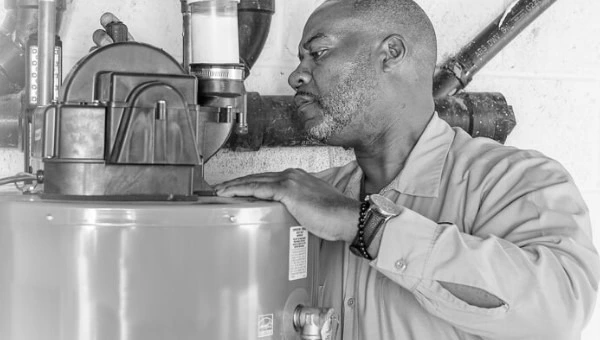
Heat Pump Water Heater vs Electric
Picture this: it’s a chilly morning, and you’re stepping into a hot, steamy shower, courtesy of your trusty water heater. Now, if you’re on the brink of choosing a new water heater, you might find yourself wading through a sea of options. Among the contenders, electric water heaters and heat pump water heaters are two notable adversaries, each vying for the spotlight in your home’s utility space.
Electric water heaters are like the steady, reliable friend we all know. They’ve been warming our water for years, using a simple mechanism that directly heats the water through electrical elements. These units are often celebrated for their lower initial costs and the straightforward installation process. They’re the go-to for many homeowners, offering a quick fix with minimal fuss.
Enter the heat pump water heater, the new kid on the block, bringing a flair of innovation to the scene. This isn’t your standard water warming affair; it’s a gadget that draws upon the warmth of the surrounding air to heat your water, adding a twist of efficiency to the mix. It’s like it’s whispering to the air, “Let’s heat things up,” capturing that energy and transforming it into something you can use.
Now, when these two meet in the ring, it’s a bout of efficiency vs. tradition. Electric water heaters, with their uncomplicated design, might throw the first punch with affordability and simplicity. But, as the rounds progress, the heat pump water heater starts to dance around its opponent, showcasing its prowess in energy efficiency and environmental friendliness.
The beauty of the heat pump water heater lies in its ability to do more with less. It’s akin to a magician pulling endless rabbits from a hat; it takes a bit of warmth from the air and multiplies it, offering hot water without the hefty energy use associated with electric water heaters. This efficiency translates to lower operating costs, potentially saving homeowners a bundle on their energy bills over the heater’s lifespan.
But it’s not just about the cost savings. The heat pump water heater is also a nod towards a greener future. By relying on the ambient air, it sidesteps the extensive energy requirements of electric models, paving the way for a more sustainable household. It’s as if you’re casting a vote for the planet every time you enjoy that warm morning shower.
As we peel back the layers of this comparison, it becomes clear that the choice between a heat pump water heater and an electric model isn’t just about hot water. It’s a decision that touches on cost, efficiency, environmental impact, and the future of your home’s energy use. So, as you mull over your options, consider not only the immediate benefits but the long-term implications of your choice.
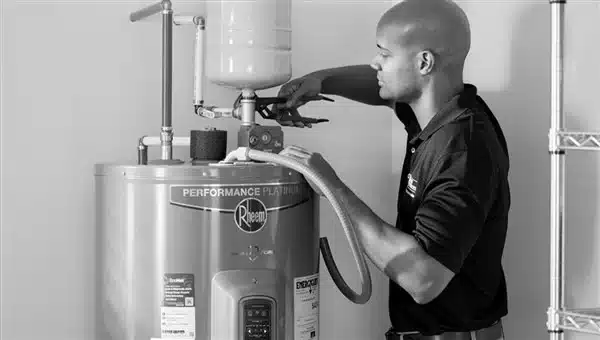
Heat Pump Water Heater vs Tankless
Embark on an adventure in the realm of water heating, and you’ll find yourself at a crossroads: choosing between the innovative heat pump water heater and the sleek, modern tankless water heater. It’s a tale of two technologies, each with its own set of marvels and mysteries. Let’s dive into this friendly duel and discover which champion might best suit your castle.
Tankless water heaters, the knights of space efficiency and the guardians of on-demand hot water, have long been celebrated for their ability to provide a continuous flow of hot water without the bulky presence of a tank. These valiant warriors against wasted space and energy are ideal for homes with limited square footage, ensuring that you’re never left in the cold mid-shower.
However, just when the tale seems to favor the tankless hero, along comes the heat pump water heater, a wizard of energy efficiency, wielding the power of the ambient air. This device doesn’t just heat your water; it performs an enchanting dance, extracting warmth from the air around it and using this captured energy to heat water. It’s a spectacle of efficiency, turning the very essence of your home’s environment into a renewable resource for warmth.
The clash between these two might seem fierce, but in reality, it’s a friendly comparison of strengths. While the tankless water heater boasts instant, endless hot water with a smaller footprint, the heat pump water heater counters with its unparalleled efficiency and lower operating costs over time. It’s like comparing apples to oranges, where each has its own sweet appeal.
Consider the energy savings of the heat pump water heater, which can be akin to discovering a treasure trove in your monthly utility bills. Its ability to leverage existing heat makes it a formidable opponent against the higher energy demands of tankless units, especially in climates where the air around us is like an untapped well of thermal energy.
The tankless system, with its swift and agile heating, ensures that you’re never waiting on the sidelines for hot water. Yet, in this enchanting duel, the heat pump water heater casts a spell of savings and sustainability, appealing to those who seek to minimize their environmental footprint and maximize their gold – er, money – savings over the long haul.
As you stand at this crossroads in the quest for the perfect water heating solution, consider not just the immediate allure of each contender, but the journey ahead. Will you side with the space-saving, instant gratification of the tankless warrior, or will you enlist the energy-efficient, cost-saving magic of the heat pump water heater? The choice is yours, noble homeowner, as you write your own tale of comfort, efficiency, and innovation.
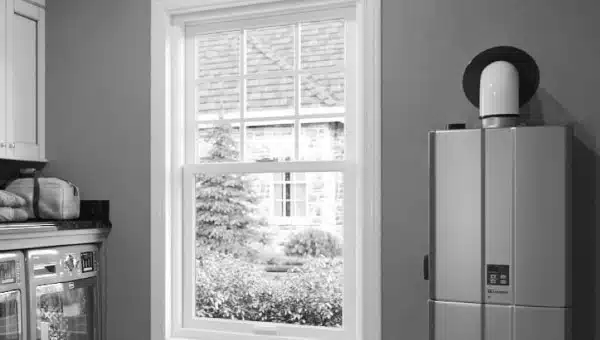
American Standard ASHPWH-50-B Review
Diving into the world of heat pump water heaters, the American Standard ASHPWH-50-B stands out as a stellar choice for those seeking efficiency without sacrificing performance. This model is a beacon of reliability and innovation, boasting a 50-gallon capacity that makes it a perfect fit for families of varying sizes. What truly sets this unit apart is its array of user-friendly features designed to simplify your life and enhance your home’s energy efficiency.
Imagine managing your water heating settings with just a few taps on a touchscreen control panel. This advanced interface allows you to easily adjust temperatures, set a vacation mode to save energy while you’re away, and monitor your system’s performance. Such convenience at your fingertips ensures that you can tailor your water heating needs to your lifestyle effortlessly.
But it’s not just about ease of use. The American Standard ASHPWH-50-B’s dedication to efficiency is evident in its operational mechanics. By harnessing the ambient air’s heat, this model operates with remarkable energy conservation in mind. This means lower operating costs and a reduced carbon footprint, aligning with the values of environmentally conscious homeowners who are not willing to compromise on comfort or performance.
Beyond its impressive efficiency and user-centric design, this model’s robust construction promises longevity and reliability. You’ll find peace of mind knowing that your investment is protected by American Standard’s commitment to quality, which is reflected in every aspect of the ASHPWH-50-B’s design and performance.
In a nutshell, the American Standard ASHPWH-50-B heat pump water heater is more than just a utility appliance; it’s a smart, sustainable choice that represents the harmonious blend of technology, efficiency, and user convenience. Whether you’re taking a proactive step towards energy conservation or upgrading your home’s appliances, this model is poised to exceed expectations and transform how you experience hot water in your home.
AO Smith ProLine XE Voltex FPTU-50 Highlights
When exploring the realm of heat pump water heaters, the AO Smith ProLine XE Voltex FPTU-50 emerges as a top contender that combines innovation with savings. This model is a testament to AO Smith’s commitment to excellence and energy efficiency, offering a sleek design alongside robust functionality. With its 50-gallon tank, this heater is well-suited for a variety of household sizes, ensuring that families big and small can enjoy the benefits of efficient hot water heating.
One of the standout features of the Voltex FPTU-50 is its ability to significantly reduce water heating costs—by up to 71%, according to AO Smith. This level of efficiency is achieved through its advanced heat pump technology, which captures ambient heat from the surrounding air to warm water, thus requiring far less electricity than traditional water heaters. It’s an eco-friendly choice that doesn’t just promise savings but also contributes to reducing your household’s carbon footprint.
This model is not only about energy savings; it’s also designed with the user in mind. A user-friendly display allows for easy monitoring and control of the water temperature, making adjustments a breeze. Furthermore, the Voltex FPTU-50 includes features such as a vacation mode, which lowers energy consumption when you’re away, enhancing its appeal to those looking to maximize efficiency and control over their water heating system.
Moreover, durability is a key aspect of the AO Smith ProLine XE Voltex FPTU-50, built to offer years of reliable service. The inclusion of a protective anode rod and a robust tank design ensures that the unit is safeguarded against corrosion, extending its lifespan and maintaining its performance over time.
In essence, the AO Smith ProLine XE Voltex FPTU-50 is not just another appliance in your home; it’s a smart investment in sustainable living, combining cutting-edge technology with practical features to provide an efficient, user-friendly water heating solution.
Exploring the Bradford White AeroTherm RE2H50S10
Venturing into the realm of high-efficiency water heating, the Bradford White AeroTherm RE2H50S10 emerges as a standout performer. With its generous 50-gallon tank, this heat pump water heater is engineered to cater to the needs of a modern household, ensuring you never have to compromise on having a steady supply of hot water. What distinguishes this model is its combination of traditional heating methods with advanced heat pump technology, providing a versatile and eco-friendly approach to water heating.
The AeroTherm RE2H50S10 is more than just a water heater; it’s a testament to Bradford White’s commitment to innovation and sustainability. The model is equipped with four operation modes—Heat Pump, Hybrid, Electric, and Vacation—giving you complete control over its operation and the flexibility to maximize energy savings without disrupting your lifestyle. This adaptability ensures that whether you’re looking to minimize your carbon footprint or simply manage your energy costs more effectively, the AeroTherm can accommodate your preferences.
One of the AeroTherm’s most commendable features is its intelligent control system, which includes a user-friendly LCD display. This interface allows for easy adjustment of settings and provides detailed diagnostics to keep you informed about the system’s performance. This level of interaction not only enhances the user experience but also empowers you to make informed decisions about your energy usage.
Moreover, the Bradford White AeroTherm RE2H50S10 is designed with longevity in mind. Its durable construction and protective features ensure that the unit remains reliable over time, safeguarding your investment. Whether it’s the sophisticated heat pump technology that draws warmth from the surrounding air or the electric elements that kick in when extra heating power is needed, this model is engineered to provide efficient, consistent hot water in a variety of conditions.
In navigating the landscape of heat pump water heaters, the AeroTherm RE2H50S10 by Bradford White represents a harmonious blend of technology, efficiency, and user-centric design, making it a worthy consideration for any homeowner looking to enhance their water heating system.
Rheem Performance Platinum XE50T10 Features
Diving into the details of the Rheem Performance Platinum XE50T10, this heat pump water heater is a powerhouse of efficiency and modern technology. With its spacious 50-gallon capacity, it’s an excellent choice for households of various sizes, ensuring a constant supply of hot water without the steep energy costs typically associated with water heating.
What sets the Rheem Performance Platinum model apart are its cutting-edge features designed to provide convenience and peace of mind. One of the standout innovations is the built-in leak detection system. This proactive feature monitors for any signs of leaks, alerting you early on to prevent potential water damage and save on costly repairs. It’s like having a vigilant guardian for your home’s water heating system, providing an extra layer of security.
In addition to safeguarding your home, this model boasts Wi-Fi connectivity. This allows you to effortlessly control and monitor your water heater from anywhere through Rheem’s intuitive app. Imagine adjusting water temperature, setting schedules, or receiving maintenance alerts all from the palm of your hand. This level of control not only enhances your home’s energy efficiency but also fits seamlessly into your lifestyle, offering both comfort and convenience.
The Rheem Performance Platinum XE50T10 doesn’t just excel in functionality; it’s also a leader in energy efficiency. Designed to maximize your energy savings, this model operates with precision, using the surrounding air to heat water and reducing reliance on electricity. This efficiency does not only contribute to lower monthly bills but also supports a more sustainable living environment.
By integrating these advanced features with a commitment to durability and efficiency, the Rheem Performance Platinum XE50T10 is not merely a water heater—it’s a smart, sustainable solution for modern living.
Final Thoughts: Is a Heat Pump Water Heater Right for You?
Embarking on the quest to upgrade your water heating system is a journey filled with choices, each path offering its own blend of benefits and adventures. As we’ve wandered through the realm of heat pump water heaters, comparing them to their gas, electric, and tankless cousins, we’ve uncovered a landscape where efficiency, cost, and environmental impact intertwine. Now, standing at the crossroads of decision, you might wonder whether the path of the heat pump water heater is the one that leads to your castle.
Diving into the heart of what makes a heat pump water heater tick, it’s clear that this innovative technology is more than just a utility upgrade—it’s a step into a future where our homes harmonize with the environment. With its enchanting ability to draw warmth from the air, a heat pump water heater is a testament to human ingenuity, turning the mundane task of heating water into a symphony of efficiency and sustainability.
Yet, every tale of adventure is personal. The allure of lower energy bills and a reduced carbon footprint is strong, but it’s the context of your individual story that will determine if this choice resonates with your home’s needs. The initial investment might seem like a dragon guarding the treasure, but the kingdom of long-term savings and environmental stewardship is well worth the quest for many.
Consider the space within your castle walls, the climate of your realm, and the size of your court. A heat pump water heater thrives in environments where it can pull from a generous pool of ambient air, making spaces like basements or garages its ideal lair. If your home sits in a land of moderate to warm climates, the efficiency of this technology shines brightest, offering you a bounty of hot water with minimal energy consumption.
Moreover, with tax credits and rebates acting as allies on your journey, the initial cost becomes less daunting, making the path forward clearer and more inviting. These financial incentives are like scrolls of wisdom, offering guidance and support as you make a choice that benefits not only your household but the world beyond your walls.
In the end, choosing a heat pump water heater is about charting a course toward a more sustainable and cost-effective home. It’s a decision that weaves together the threads of personal values, environmental consciousness, and economic pragmatism into a tapestry that tells the story of your commitment to a better tomorrow.
FAQs
Is it worth it to get a heat pump water heater?
An ENERGY STAR certified heat pump water heater is truly remarkable for its outstanding efficiency, surpassing both standard electric and gas models by a significant margin, making it a standout choice for environmentally conscious consumers. To provide context on the notable benefits it offers, the energy savings generated by such a cutting-edge system are truly profound.
For instance, when these advanced units are compared to traditional electric water heaters, the potential savings are substantial, equating to an estimated $550 annual reduction for a family of four. This heightened efficiency is thanks to the state-of-the-art technology integrated into ENERGY STAR certified heat pump water heaters. This innovative technology is designed to significantly curtail energy usage and operating expenses, thus making these water heaters not only economical but also environmentally friendly options for households seeking to reduce energy consumption and lower utility bills without compromising on performance and comfort.
What are the disadvantages of a heat pump water heater?
Due to the reliance on extracting warmth from the surrounding air, heat pump water heaters face limitations when temperatures drop significantly, leading to decreased efficiency or even failure to operate in colder climates. As a result, the practicality of using a heat pump water heater can be challenging in regions where winters are harsh and temperatures remain consistently low. Despite the energy-efficient advantages provided by these systems in moderate or warmer climates, their effectiveness diminishes as the external air temperature decreases, making them less viable options for areas prone to extended periods of cold weather.
In such instances, homeowners may encounter difficulties in relying on heat pump water heaters as their primary source of hot water, prompting a need to explore alternative heating solutions that can better withstand colder environmental conditions. Therefore, when considering the installation of a heat pump water heater, it is essential to take into account the climate and temperature variations of the specific region to ensure that the system will function optimally and provide the desired efficiency level throughout the year, minimizing potential operational challenges.
What is the life expectancy of a heat pump water heater?
Traditional water heaters, which are found in many homes, usually have a lifespan of approximately 8 to 12 years. It’s important for homeowners to be aware of this timeframe so that they can plan ahead for necessary replacements. This is where heat pump water heaters come into play. These innovative alternatives have a longer life expectancy compared to their traditional counterparts, typically lasting between 10 to 15 years if they receive proper maintenance and care. This increased longevity can be a significant advantage for those looking to invest in a more durable and sustainable water heating solution for their homes.
By choosing a heat pump water heater and adhering to regular maintenance schedules, homeowners can enjoy the benefits of reliable hot water for an extended period. It’s crucial to remember that routine check-ups and servicing play a key role in prolonging the lifespan of any water heater, regardless of the type. With the right attention and care, switching to a heat pump water heater can not only provide long-term cost savings but also ensure consistent performance for your household’s hot water needs. By understanding the lifespan differences between traditional and heat pump water heaters, homeowners can make informed decisions that align with their long-term sustainability goals.
Is a heat pump water heater better than a tankless water heater?
Heat pump water heaters stand out as the undeniable top choice across various aspects. Not only are they exceptionally energy-efficient, which significantly reduces operational expenses, but they also qualify for attractive incentives, further enhancing their cost-effectiveness. In addition to their cost-saving benefits, these water heaters are recognized for their superior safety features and reliability when compared to gas-fired tankless water heaters.
The peace of mind that comes with using heat pump water heaters is unparalleled, ensuring both efficient energy consumption and long-lasting performance. With their impressive track record and numerous advantages, it’s no wonder that heat pump water heaters are the preferred option for households seeking reliable, economical, and environmentally friendly water heating solutions. The combination of efficiency, economic benefits, safety, and reliability positions heat pump water heaters as the ultimate choice for those looking to optimize their hot water systems. The overall value that these water heaters provide in terms of long-term savings, reduced environmental impact, and dependable performance solidify their status as the premier option in the market.
Where is the best place to put a heat pump water heater?
An ideal location for setting up a cozy and comfortable space is usually a semi-heated area, like an unfinished basement or garage, where you can create a warm and inviting atmosphere to relax and unwind. These types of spaces offer a perfect spot for creating a personalized haven where you can escape the hustle and bustle of daily life and enjoy some peaceful moments on your own terms. By utilizing such a location, you can easily transform it into a multifunctional area that can serve as a home gym, office, or hobby area, depending on your unique preferences and needs.
Additionally, the semi-heated setting ensures that you can enjoy a moderate temperature that is neither too hot nor too cold, allowing for a pleasant environment throughout the year. With the flexibility and versatility that a semi-heated space provides, you have the freedom to customize it according to your taste and style, creating a space that truly reflects your personality and interests. Overall, choosing an unfinished basement or garage as your ideal location offers endless possibilities for creating a functional and enjoyable space that suits your lifestyle and helps you make the most of your living environment.
Conclusion
With our team’s collective knowledge and years of experience in the industry, backed by unparalleled commitment to meeting the distinctive requirements of every client, we guarantee not only our capability but also our preparedness to efficiently manage any plumbing task presented to us. Our track record speaks volumes about our reliability and competence. It doesn’t matter if your project is extensive or intricate, as we assure you that Clovis Plumbing Services will consistently prove to be the reliable ally you need to address all your plumbing concerns, delivering top-notch results every time.

